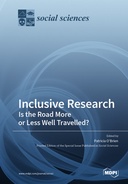Explore

Inclusive Research: Is the Road More or Less Well Travelled?
0 Ungluers have
Faved this Work
Login to Fave
The purpose of this Special Issue on inclusive research is to capture internationally, “How far have we come?” and “Where do we need to go?” Such questions are relevant now that it has been close to two decades since Walmsley and Johnson (2003) first introduced the inclusive research paradigm in their text, Inclusive research with people with learning disabilities: past, present, and futures. Within this Special Issue we have reprinted 18 articles that promote inclusive research as a paradigm that has succeeded in transferring power to people with intellectual disabilities who were once the "researched" to now being and becoming the "researchers". The articles draw upon the work of co-researchers both with and without the lived experience of disability who have adopted inclusive research as a paradigm to redress the exclusion of people with intellectual disabilities as researchers. All the 18 articles have an eye on the future and are sequenced across the following themes: the individual impact of being and becoming an inclusive researcher; building inclusive research relationships as a duo; being part of an inclusive research network; and using inclusive research to push boundaries and facilitate issues of importance identified by people with disabilities. The reprint concludes with two articles where inclusive researchers of long standing reflect on how to continue to walk forward on the road that aided by this reprint will become more well-travelled?
This book is included in DOAB.
Why read this book? Have your say.
You must be logged in to comment.
Rights Information
Are you the author or publisher of this work? If so, you can claim it as yours by registering as an Unglue.it rights holder.Downloads
This work has been downloaded 114 times via unglue.it ebook links.
- 114 - pdf (CC BY) at Unglue.it.
Keywords
- accessible academic literature
- Action Research
- Advocacy
- and practice
- assistive technology
- autoethnography
- belonging
- capacity building
- co-design
- co-researching
- Collaboration
- collaborative autoethnography
- collaborative groups
- Community
- community researchers
- consumer-led
- COVID-19
- creative methodologies
- criminal justice system
- design research
- Developmental disability
- Disability
- Disability Studies
- Down Syndrome
- Employment
- ethnography
- former prisoners
- Funding
- Happiness
- Health
- Higher Education
- impact
- Inclusion
- Inclusive
- Inclusive education
- inclusive employment
- inclusive research
- Intellectual Disabilities
- Intellectual Disability
- Intersubjectivity
- learning/intellectual disability
- Life history
- Lived Experience
- manifesto for inclusive research
- Mental health
- n/a
- Pandemic
- Participatory research
- people with intellectual disabilities
- policy
- Prisoners
- Profound intellectual and multiple disabilities
- Psychology
- Qualitative research
- Quality of life
- Rehabilitation
- relationships
- Research
- Research methods
- research with people with intellectual disability
- research with people with learning disability
- Rights
- Self-Advocacy
- Sex Education
- Sexual abuse
- sexuality and gender identity
- Social workers
- Society & Social Sciences
- space and non-accessible space
- students with intellectual disability
- university
Links
DOI: 10.3390/books978-3-0365-6309-1Editions

